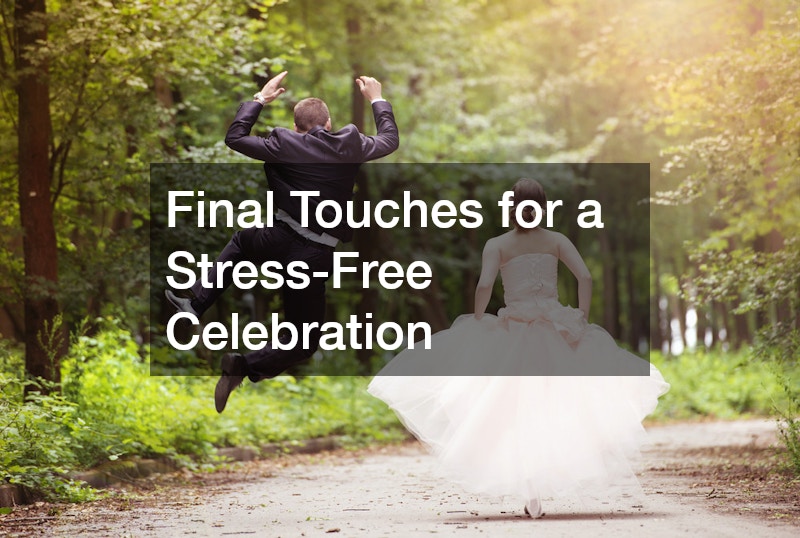Engagement is one of the most exciting chapters in life. The moment you say “yes,” your mind starts racing with images of a beautiful wedding, celebrating with family and friends, and stepping confidently into married life. But soon after the thrill fades, many couples find themselves facing the whirlwind of logistics, budgeting, and endless decisions. What should feel like a joyous journey can quickly spiral into sleepless nights and unnecessary stress.
That’s why creating a thoughtful, step-by-step plan for marriage is so essential. It’s not just about organizing a party; it’s about setting a foundation for your new life together, while ensuring your wedding day truly reflects who you are as a couple. A stress-free plan combines clear communication, realistic expectations, and smart choices about venues, attire, transportation, food, and even legal details.
This guide will walk you through everything from the first conversations to the final touches, offering practical strategies to keep you calm and in control. By the time you’re finished reading, you’ll have a clear sense of how to craft a wedding that feels effortless and memorable — without the panic that often comes with planning.

- Building the Foundation of Your Plan
- Choosing the Perfect Venue
- Attire and Symbols of Commitment

- Outdoor Wedding Possibilities
- Transportation That Keeps Things Moving
- Food and Drink Options

- Alternative Venues for Unique Weddings
- Destination and Intimate Options
- Weddings in the Great Outdoors

- Final Touches for a Stress-Free Celebration
Building the Foundation of Your Plan
Before you book anything or try on a single dress, the first step in a stress-free plan for marriage is sitting down with your partner to align expectations. Many couples skip this and jump straight into details, which often leads to disagreements later. Instead, carve out an evening to talk about the big picture: how many guests you want, what your budget range looks like, and which elements matter most to each of you.
Some couples dream of a grand, 200-person celebration, while others prefer a simple gathering of 30 loved ones. Knowing this early helps avoid wasted time touring venues or talking to vendors that don’t fit your shared vision.
Budgeting is another cornerstone of the foundation. Rather than guessing, research average costs in your area and prioritize your spending. If photography and food are most important to you, allocate more of your budget there, while cutting back on areas that don’t feel as essential.
It’s also wise to think beyond the wedding day. A family attorney can help draft a prenuptial agreement, update wills, or advise on name changes and shared financial responsibilities. While not the most romantic topic, handling legal and financial matters before the wedding can prevent misunderstandings later. Incorporating these practical steps into your plan not only keeps things stress-free but also strengthens trust between you and your partner.
Choosing the Perfect Venue
Once your vision and budget are clear, the next step in your plan for marriage is selecting a venue. The location you choose will influence almost every other decision — from décor and catering to attire and transportation.
A banquet hall is a classic option for couples who want everything under one roof. Most banquet halls offer ample space, built-in catering, and professional staff, which can significantly reduce stress. They’re ideal if you want a formal atmosphere and don’t want to coordinate multiple vendors on your own.
But don’t stop at tradition. Think about your personalities and what kind of setting will make you both feel comfortable. If you’re food lovers, a small restaurant might make more sense. If you love the outdoors, an open-air venue could be perfect. When touring spaces, always ask what’s included — tables, chairs, sound systems, and parking can add up if they’re not part of the package.
Book your venue early. Many popular spaces are reserved a year or more in advance. Once you have a confirmed location, you’ll find it easier to visualize the rest of your plan, from how the décor will look to the number of guests you can realistically invite.
Attire and Symbols of Commitment
Few wedding details feel as personal as what you wear and what you exchange during the ceremony. The attire and rings are deeply symbolic and deserve their own space in your plan for marriage.
The wedding dress is often the centerpiece of the event. Whether you dream of a flowing ball gown, a sleek modern silhouette, or something entirely unconventional, the key is to start shopping early. Dresses often require several fittings and alterations, and leaving this until the last minute can cause unnecessary stress. Consider how the dress fits with your venue — a lightweight gown works better for outdoor weddings, while a formal hall might call for something more structured.
Equally important is the wedding ring, which represents your lifelong commitment. Rings should be chosen with both aesthetics and practicality in mind. Think about your lifestyle — if you work with your hands, you’ll want something durable and low-maintenance. Budget wisely as well; while some follow the traditional “two months’ salary” guideline, others prioritize affordability or prefer to invest in unique, custom designs.
By including attire and rings early in your plan, you ensure that these deeply personal elements are handled with care and without the panic of last-minute shopping.
Outdoor Wedding Possibilities
Outdoor weddings can be breathtaking, but they come with one unavoidable challenge: the weather. Rain, wind, or extreme sun can quickly derail even the best-laid plans if you’re not prepared. That’s why couples who include outdoor options in their plan for marriage should always think about comfort and contingency.
One of the most practical investments for outdoor weddings is tent rentals. A high-quality tent not only provides shelter from unexpected showers but also creates a cozy, elegant atmosphere under the stars. Today’s tents can be fully customized with lighting, flooring, and sidewalls, turning a basic field into a magical event space.
When choosing a tent, consider the size of your guest list and the layout you want inside — whether that’s long banquet-style tables, a central dance floor, or lounge seating areas. It’s also smart to ask your vendor about delivery, setup, and breakdown times so you don’t find yourself scrambling at the last moment.
Building weather contingencies into your plan doesn’t mean you’re being pessimistic; it means you’re being realistic. And nothing feels better on your wedding day than knowing you’ve already thought through the “what ifs.”
Transportation That Keeps Things Moving
Transportation often gets overlooked until the last minute, but it can make or break the flow of your wedding day. If guests struggle to find parking or if the bridal party arrives late, stress levels rise quickly. A smart plan for marriage accounts for how everyone will move from one location to another.
Hiring a limousine company is a tried-and-true way to ensure smooth travel for the couple and key members of the wedding party. Beyond the elegance, a limo provides comfort and reliability, allowing you to relax between the ceremony and reception. For larger weddings, consider shuttle services to move groups of guests efficiently, especially if parking is limited.
Timing is everything. Create a detailed transportation schedule that includes pickup and drop-off times, addresses, and backup contacts. Share this with both your transportation provider and your wedding planner (if you have one) to keep everyone on the same page. With reliable logistics built into your plan, you can focus on the joy of the day rather than worrying about delays.
Food and Drink Options
Ask any wedding guest what they remember most, and chances are food will be high on the list. A thoughtful catering choice not only keeps people happy but also sets the tone for the entire celebration. That’s why food deserves careful attention in your plan for marriage.
For smaller, more intimate weddings, partnering with a local restaurant can be a stress-free solution. Many restaurants offer private dining rooms or catering services, allowing you to enjoy high-quality meals without the hassle of coordinating a separate caterer. This option often comes with built-in staff, which simplifies service and cleanup.
When planning food, consider dietary needs, cultural traditions, and the flow of the event. For example, cocktail hours with passed appetizers can keep guests entertained while photos are being taken. Dessert bars or late-night snacks are fun extras that add personality.
By securing your catering choice early, you’ll avoid the scramble of last-minute menu decisions. Plus, knowing that delicious food is locked in will give you one less thing to worry about in your plan.
Alternative Venues for Unique Weddings
Not every couple dreams of a traditional ballroom setting. If you want a celebration that feels truly yours, it’s worth exploring less conventional spaces as part of your plan for marriage.
A party venue, such as a converted loft, warehouse, or art gallery, offers flexibility and character. These venues allow you to design a layout that matches your vision, whether that’s industrial chic, bohemian, or minimalist. Because they’re often blank canvases, you have the freedom to bring in your own caterers, décor, and entertainment.
Of course, this flexibility can also add complexity. When booking a party venue, make sure you understand what’s included (lighting, sound equipment, restrooms) and what you’ll need to provide yourself. It’s also worth checking local regulations about noise, alcohol service, and parking.
Choosing an unconventional space adds personality but also demands strong organization. Including these details in your plan ensures your unique venue feels intentional rather than chaotic.
Destination and Intimate Options
Not every wedding needs to be a grand affair. For couples who prefer a smaller, more intimate celebration, incorporating creative accommodations into the plan can make the event even more special.
An Airbnb rental is a versatile option. Imagine booking a beachfront villa for a weekend wedding, or a cozy countryside home where your closest family can stay together. These properties often allow for multi-day events, giving you more time to connect with guests instead of feeling rushed through a single evening.
When choosing an Airbnb, confirm with the host that events are permitted, as some listings have restrictions. Also, consider amenities like kitchens, outdoor space, and nearby hotels for overflow guests.
Incorporating this option into your plan gives you the chance to create not just a wedding, but a full weekend experience that everyone will remember.
Weddings in the Great Outdoors
For adventurous couples, nothing compares to saying “I do” surrounded by nature. If you and your partner love hiking, camping, or simply being outside, a campground wedding might be the perfect fit for your plan for marriage.
Campground weddings often turn into weekend-long celebrations, where guests can arrive on Friday, enjoy the ceremony on Saturday, and spend Sunday sharing stories around a fire. This creates a relaxed, communal atmosphere that goes far beyond the traditional one-day wedding.
Of course, planning a wedding in the wild requires extra organization. Permits may be needed, and you’ll want to think about restroom facilities, electricity, and sleeping arrangements. But with careful preparation, a campground wedding can be both cost-effective and unforgettable.
By planning early and coordinating with park officials or campground managers, you’ll create an event that feels seamless while honoring your love for the outdoors. Building this kind of personal touch into your plan ensures your wedding is as unique as your relationship.
Final Touches for a Stress-Free Celebration
By now, you’ve seen how every piece — venues, attire, rings, transportation, food, and even legal matters — fits into a larger puzzle. The secret to a stress-free wedding is treating your plan as a living document. It should evolve as you make decisions, book vendors, and fine-tune your vision.
As the big day approaches, create a detailed timeline for both you and your vendors. Share this schedule with your wedding party so everyone knows where they need to be and when. Don’t be afraid to delegate tasks — trusted friends and family are often happy to help.
Finally, remember that perfection isn’t the goal. A stress-free wedding is one where you feel present, joyful, and connected to the people you love most. By investing time in your plan, you’ve already done the hard work. Now it’s time to let go of the stress and enjoy the celebration of your new life together.
A wedding is more than a single day; it’s the start of a lifelong partnership. By building a thoughtful, organized marriage plan, you can avoid the overwhelm and focus on what truly matters: celebrating your love. Whether your dream day takes place in a banquet hall, under a tent, at a restaurant, or even in a campground, success lies in preparation, communication, and flexibility.
When you look back, you won’t remember the tiny details that went wrong — you’ll remember how you felt walking down the aisle, exchanging rings, and dancing with your partner surrounded by loved ones. That’s the real reward of creating a plan that not only manages logistics but also nurtures peace of mind.
So take a deep breath, start planning early, and enjoy the process. With the right plan for marriage, your wedding will be everything you hoped for — and a stress-free beginning to the journey ahead.









